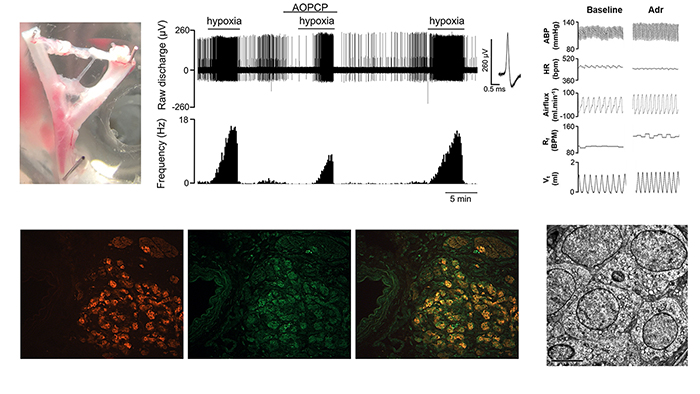Birmingham Arterial Chemoreceptor and Hypoxia Group

Group Leaders:
Overview
Our research group focuses on defining the role of the carotid body chemoreceptors, in cardiovascular, respiratory and neuroendocrine physiology and pathology. We are interested in understanding how the carotid body senses oxygen, carbon dioxide, hypoglycaemia and other blood-borne chemicals. We also examine the mechanisms underlying the pathological changes in carotid body function that lead to neurogenic hypertension, cardiac arrhythmia and breathing instability associated with important diseases such as diabetes, obstructive sleep apnoea and COPD. We aim to develop new treatments to target the carotid body to improve cardiovascular function in these patients.
Our research group
The sensing of arterial blood gases and other blood-borne chemicals is mediated via specialised chemoreceptor cells in the carotid body. Carotid body stimulation is important in initiating cardiovascular, respiratory and neuroendocrine reflexes in response to hypoxia, hypercapnia, hypoglycaemia and acidosis, and acts to preserve arterial blood gases, blood glucose and pH. However, in the certain diseases such as obstructive sleep apnoea, diabetes, COPD and heart failure the carotid body becomes over-active leading to neurogenic hypertension and arrhythmia, thereby increasing cardiovascular mortality in these patients.
Our research is aimed at (i) understanding the chemotransduction processes involved in these cells – from the molecular mechanisms involved in detecting the stimulus through to the initiation of afferent neural signals, (ii) characterising the mechanisms of carotid body over-activity in diseases including obstructive sleep apnoea, diabetes and COPD and iii) developing carotid body targeted drug treatments to reduce hypertension and arrhythmia.
We undertake in vivo measurements of cardiovascular, respiratory and neuroendocrine reflex function. In addition, we perform in vitro measurements of carotid body afferent neural discharge as well as detecting the localisation of cellular proteins with immunohistochemistry. The work is complemented by associated research with collaborators at Heartlands Hospital and the Queen Elizabeth Hospital, where human studies are performed to examine the impact of intermittent hypoxia/sleep apnoea and diabetes upon cardiorespiratory control. We also have strong national and international collaborations with researchers within the field and are active participants at major conferences.
- Evaluating the role of nitric oxide and mitochondria in carotid body O2 sensing
- Examining the role of ecto-5’-nucleotidase (CD73) in establishing carotid body sensitivity to hypoxia and hypercapnia
- Adrenaline activation of the carotid body: examining the importance of the carotid body in hypoglycaemia-induced hyperpnoea and the potential detrimental effects in cardiovascular disease
- Investigating how co-morbidities of obstructive sleep apnoea and diabetes interact to worsen cardiovascular outcomes in patients
- Exploring how early exposure (in utero or post-natal) to chronic intermittent hypoxia and inflammation impacts on carotid body development and if this predisposes to cardiovascular disease
Recent/ Selected Publications
PI(s)
Professor Prem Kumar
Dr Andrew P Holmes
Dr Clare J Ray
Dr Andrew M Coney
Students
Abdulaziz Alzahrani
Ziyad Alshehri
Internal Collaborators
Dr Abd A Tahrani, Institute of Metabolism and Systems Research, NIHR Clinician Scientist, Honorary Consultant Endocrinologist at Heart of England NHS Foundation Trust
Professor Daniel A Tennant, Tennant Research Group, Institute of Metabolism and Systems Research
NHS Collaborators
Professor Brendan Cooper, Respiratory and sleep physiology, University Hospitals Birmingham NHS Foundation Trust
External Collaborators
Dr Keith J Buckler, University of Oxford, UK
Dr Christopher N Wyatt, Wright State University, USA